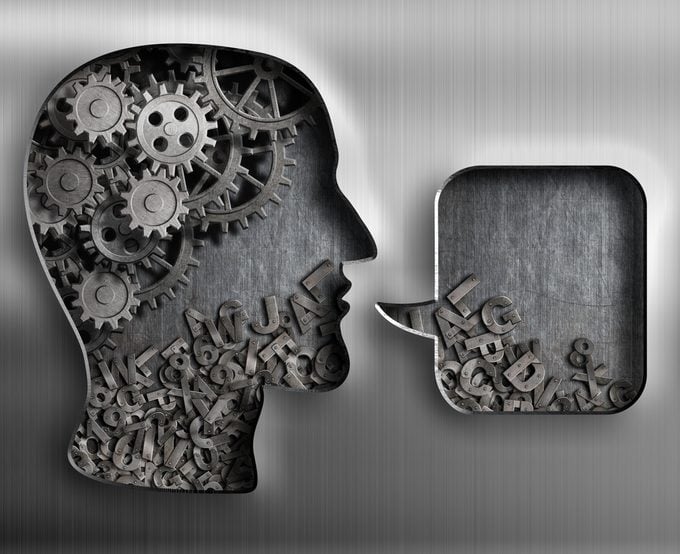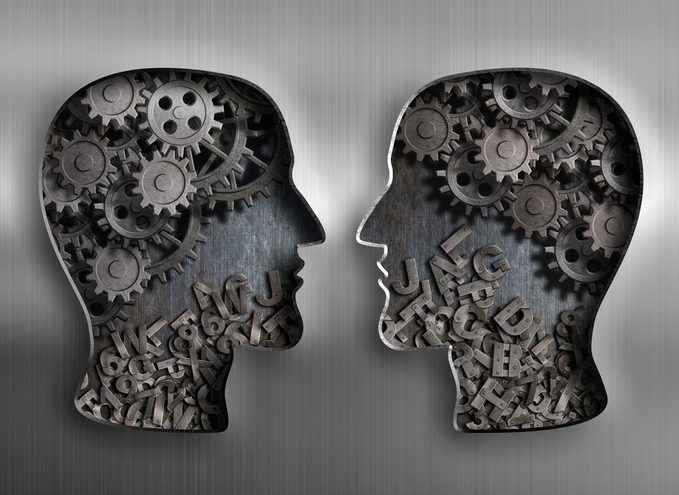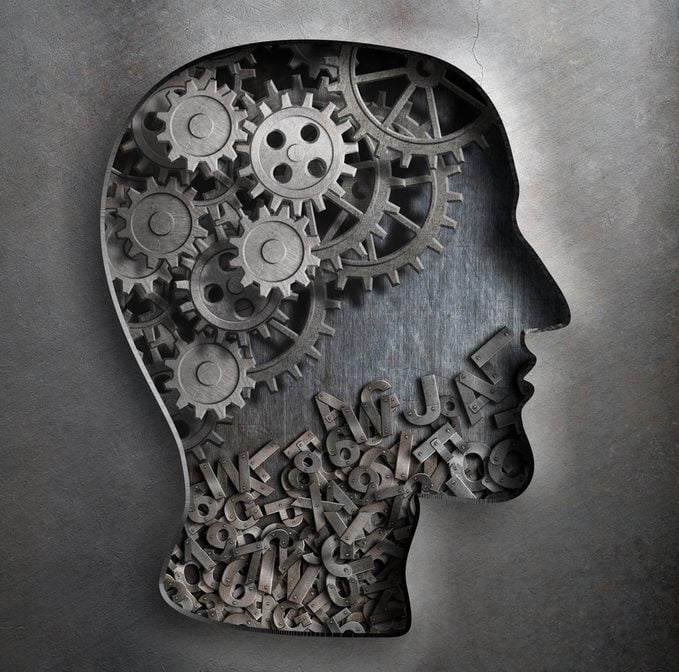52 Psychology Terms You Keep Using Wrong
Updated: Nov. 24, 2022
Everyone likes to sound smart when talking about psychology—but do you really know what those terms mean that you're tossing around? Here's a professional guide.

The research
Psychology professors from several major universities across the United States—and one from Australia—published a study consisting of 50 pairings of psychological terms that are commonly confused not only in popular writing and media but also in academic writing. “Having taught undergraduate psychology at the University of Arizona for 22 years, I have seen thousands of students struggle to differentiate many of these terms,” says Victor Shamas, PhD, who wasn’t involved in this particular study.
These are the terms that you are likely to run across most frequently, and how professionals distinguish between them. Check out these 51 “facts” that are actually wrong.
Sensation vs. perception
These two aren’t synonyms. Sensation, as its root (sense) implies, involves using one or more of the five senses to draw raw data from the environment. By contrast, perception involves the interpretation of data. Thus, it is actually incorrect to note that you “sense” you’re being followed. In fact, you sense shadows in your peripheral vision, but drawing the conclusion that you’re being followed requires perception. Of course, not all perception is rational. Read about 11 psychology experiments that went horribly wrong.
Conformity vs. obedience
Both of these terms refer to influences that motivate behavior—the difference is the source of that influence. Conformity refers to the influence that comes from peers. Obedience is top down—a parent, teacher, or other authority figure directs your behavior. Try to embrace these 13 things psychologists wish you knew about happiness.
Prejudice vs. discrimination
Prejudice refers to a belief or opinions someone holds in his or her mind; discrimination is behavior—the acting out of prejudice. Although you may never speak your prejudices aloud, your discrimination reveals your prejudices via action. Learn the 10 signs you’re smarter than you think.
Race vs. ethnicity
Race has traditionally been defined in terms of biological differences, although increasingly, experts in the social and biological sciences argue that it is a biologically meaningless term. Ethnicity may be defined by racial as well as cultural, linguistic, national, and religious influences.
Negative reinforcement vs. punishment
Punishment is relatively clear to every parent and child, teacher and student, or even boss and employee: If you fail to accomplish a task—clean your room, turn in your homework, or make a deadline—you face consequences, such as being grounded, serving detention, or working over the weekend. Negative reinforcement is completely different—a classic example is remembering the time you got sunburned at the beach, and using that memory to help you remember to apply sunscreen whenever you head outdoors. Negative reinforcement, the researchers note, “increases the likelihood of a previous behavior,” while punishment “decreases the likelihood of a previous behavior.”
That said, negative reinforcement doesn’t necessarily shape behavior intentionally. For example, if you have a headache (negative stimulus) and you take an aspirin, you learn by way of negative reinforcement to take aspirin to relieve headache pain. You may want to try these 10 top psychology tips to spend less while shopping.
Anxiety vs. fear
This difference is a little easier to grasp: You fear something real—an actual threat. You have anxiety about something that may or may not happen. While fear will diminish immediately after the threat dissipates, anxiety can persist. If anxiety—or fear—is an issue, try these 14 calming phrases you can say to yourself to find relief.

Stressor vs. stress
Stressor refers to an event that causes stress. Stress, by contrast, is what the person feels in response to a stressor. Here’s how Denise Dixon, PhD, a licensed psychologist in New York, puts it:
- Stressors are external. Stressors come from the outside.
- Stress is internal. It is one’s subjective experience.
Know the difference between stress and anxiety.
Obsession vs. compulsion
People often confuse these terms—or at least use them interchangeably—thanks to the designation obsessive-compulsive disorder (OCD). In the study of psychological terms, the authors define obsession as “recurrent and persistent thoughts, urges, or images that are … intrusive or unwanted.” Compulsions are repetitive behaviors or thoughts that an individual feels driven to do in response to an obsession—or according to rules the person has created for him- or herself.
The bottom line is that obsessions refer only to thoughts, whereas compulsions may refer to behaviors or thoughts. Find out the 8 clear signs you may be suffering from OCD.
Shame vs. guilt
Everyone seems to agree that shame and guilt are not the same. What no one can seem to agree on is how they differ. According to the study authors, “Most research suggests that shame is a global negative evaluation of the self in the wake of behavior,” whereas “guilt is a specific negative evaluation of the behavior, itself.” It’s that feeling of knowing you did a bad thing, and you feel bad about it.
As Pepperdine University professor Steven Sultanoff, PhD, puts it, with shame, you think, “I did something bad, which makes me a bad person,” but with guilt, you think, “I did something bad, but I’m still a good person.” Cut down on your negative feelings with these 22 ways to stop feeling guilty.
Envy vs. jealousy
Most people use these words interchangeably. However, the study authors advise that if you want to use them as psychological concepts, then only use envy when you’re talking about one other person. For example, “I envy that you’re going on vacation next week.” Jealousy, by contrast, involves three or more people. For example, “I’m jealous of people who get to travel.”
New York licensed clinical psychologist and psychotherapist Anthony P. DeMaria, PhD, concurs, defining envy as a “two-person” phenomenon whereby we desire something someone else has (“I envy your promotion”), and jealousy as a phenomenon that inherently involves more than two people (“I’m jealous that you’ve been spending all your time with that other person, rather than me”).
Subconscious vs. unconscious
Sigmund Freud used the term subconscious in his early writings to refer to the region of the mind that lies immediately below consciousness, according to the study authors—although Freud later abandoned the term. Others followed suit, although nowadays, some cognitive psychologists still use the word to describe mental contents that are not presently conscious but are accessible. “In this regard,” the study authors note, the subconscious is distinguished from the unconscious—thoughts that are “inaccessible to awareness.”
New Jersey clinical psychologist Anna Kress, PhD, says that these days, the term unconscious is used almost exclusively to refer to the part of the mind that’s outside of awareness but accessible through various means (including psychotherapy), the implication being that no part of the mind is completely inaccessible. Kress believes that what contributes to the confusion is that “you still see the term subconscious used in self-help books that are written by people outside of the mental health field.”
Repression vs. suppression
Both of these terms refer to eliminating a memory, the study authors note, but suppression is something people do intentionally to bury a bad memory; repression is when someone unknowingly forgets trauma. “When we consciously try to forget something, it’s suppression,” says Anna-Maria Tosco, a licensed psychologist practicing in Montreal, Canada. “With suppression, we know what we’re doing, and what we’re trying to forget is still there in our minds. But some thoughts are so threatening to our sense of comfort and ease that we unconsciously banish them from our conscious awareness.” Avoid doing these 18 things that happy people never do.
Empathy vs. sympathy
Empathy is putting yourself in someone else’s shoes to the extent that you’re actually able to feel what that other person is going through, Dixon explains. To only imagine what someone else might be feeling is sympathy—that’s feeling for someone else, as Tosco puts it: “It’s recognizing the other person’s emotion but not necessarily having or feeling those emotions.”
Rhode Island mental health therapist Nicole Iannelli, LMHC, offers the following examples to help illustrate the difference:
- “I know firsthand how exhausting it is to be a caregiver, and so I feel empathy for you.”
- “I can only imagine how difficult it is to be a caregiver, and so I feel sympathy for you.”
Antisocial vs. asocial
Although these terms sound an awful lot alike, they couldn’t be more different. An asocial person chronically withdraws from others. “They’re not happy or unhappy about it,” Davis points out. “They simply aren’t interested.” (Someone with social anxiety, by contrast, would like to interact with others but feels anxiety when contemplating or when doing so.
By contrast, an antisocial person is interested in interacting, but in a negative way, and often for the purpose of getting something he or she wants. Antisocial individuals will be reckless or irresponsible in their interactions with others. Learn more about social anxiety and ways to calm your mind.
Psychopathy vs. sociopathy
This is an especially important distinction to clarify:
- Psychopathy, otherwise known as psychopathic personality, is characterized by superficial charm, poise, and low anxiety on one hand, and guiltlessness, callousness, dishonesty, and poor impulse control on the other.
- Sociopathy is a colloquial term that appears to mostly refer to antisocial personality disorder, which describes people with little regard for laws, rules, or social niceties; they also have little regard for their safety or the safety of others.
Given the persistence of the colloquial usage of the term sociopathy, Dixon suggests thinking of psychopaths as those whose antisocial behavior is extreme enough that a professional might stipulate that the person has lost touch with reality, whereas a sociopath’s reality testing is intact but distorted. Check out these 13 signs that you might be dealing with a psychopath.
Delusion vs. hallucination
Hallucinations are experiences that seem real but don’t involve sensory feedback. By contrast, delusions involve perceptions (see the distinction between sensation and perception above) that are not widely shared by other members of an individual’s culture or subculture, the study authors explain.
“Delusions are faulty conclusions,” explains Nicki Nance, PhD, a licensed psychotherapist in Florida. “They involve the thought process. Hallucinations involve seeing, hearing, or feeling things that are not there.”
A person is delusional if he believes he is godlike, says Davis, whereas a person is having a hallucination if she, for example, hears the voice of God.
Schizophrenia vs. multiple personality disorder

“Schizophrenia is characterized by a severe splitting of functions, such as cognition, emotion, and motivation, within a single person,” the study authors explain. The breakdown between thoughts, emotions, and behavior leads to bizarre and inappropriate behavior and beliefs—but that split doesn’t refer to personality types. “In multiple personality disorder, now termed dissociative identity disorder, the individual’s mind ostensibly harbors two or more distinct personalities.” Check out what it’s really like to have schizophrenia.
Serial killer vs. mass murderer
The difference here is a matter of time: A serial killer kills once and then cools off before repeating his heinous act. The BTK Killer is one such example—learn more about this horrific man here.
By contrast, a mass murderer commits one mass killing—such as the Las Vegas, Nevada, shooting in 2017. Read these 15 facts from psychologists about social anxiety disorder.
Study vs. experiment
A study refers to any kind of psychological investigation. An experiment is a type of study. In an experiment, participants are randomly assigned to groups, and the researchers manipulate at least one independent variable. Some studies consist of many experiments. Check out these 46 weird facts that most people don’t know.
Risk factor vs. cause
One mistake that people frequently make when talking about scientific studies is that they confuse causation with correlation. Cause is definitive: If you’re hit by a bus, it’s the cause of your injuries. Cause gets trickier when it comes to disease: For example, we know that smoking causes lung cancer, but it doesn’t always cause lung cancer, and not all lung cancers are caused by smoking, as Davis points out.
That is where risk factors come in. According to the authors of the study, a risk factor precedes the onset of a condition and is also associated with a heightened likelihood of the condition developing. As Dixon puts it, risk factors increase the likelihood of your contracting a disease; knowing the cause means that you definitively know what went wrong.
Classification vs. diagnosis
Diagnosis is doctors’ professional shorthand that lets others know what they believe is going on with a patient, Davis explains. On the other hand, classification refers to a group of diagnoses. Thus, depression is a diagnosis that is classified as an affective disorder.
Disease vs. illness
These are closely related, but you can tell them apart this way, according to the study authors:
- A disease is the specific pathology or malfunctioning of a body part.
An illness is a person’s reaction to the disease.
Symptom vs. sign
Ah, symptoms and signs. Here’s the distinction:
- Symptoms are subjectively reported by patients.
- Signs are objective and observable by clinicians.
Davis offers the following example: “A patient will report symptoms of feeling hot and itchy. A doctor will recognize that these are signs of an allergic reaction.”
Relapse vs. recurrence
A relapse is the recurrence of symptoms of a condition from which an individual has not yet recovered. A recurrence is a return to the symptoms following recovery (defined by the study authors as a period of at least six months following treatment). According to WebMD, most people who are diagnosed with depression will have at least three or four recurrences during their lifetimes. But there’s hope for people with depression. Learn these facts about depression that psychologists wish you knew.
Coma vs. persistent vegetative state
These terms are routinely confused, so here’s how you can tell them apart:
- At the neurological level, a coma is like a deep sleep. The brain is dormant, awaiting a kick from an internal generator. Someone in a coma will be unresponsive to light, sound, or verbal communication and is incapable of initiating purposeful action. There is no “sleep-wake cycle,” because the person is in a persistent sleeplike state.
- A persistent vegetative state is a form of “wakeful-unconsciousness.” The person’s level of consciousness may appear to vary in response to stimulation, and certain reflexes and automatic responses (such as yawning, grimacing, moaning, and opening eyes) are preserved. The person has a sleep-wake cycle, with occasional eye-opening and closing.
People can experience a coma following traumatic brain injury, drug overdose, lack of oxygen to the brain, or an illness, and a coma can progress to a persistent vegetative state. Comas typically last less than a month, after which the person emerges with varying degrees of brain damage or none. By contrast, a persistent vegetative state is ongoing and may involve permanent brain injury. In one highly publicized case, Terri Schiavo, a Florida woman, remained in a persistent vegetative state for 15 years before being taken off life support, the study authors note.
Insanity vs. incompetence
This one is kind of a trick because both insanity and incompetence are psychological terms whose most important uses are in the context of court cases, and as laymen, we throw both of them around in inappropriate ways, like when we refer to other people driving us insane.
- When a criminal defendant is determined to be “insane,” he or she cannot be found guilty of a crime. In most cases, this hinges on whether the defendant understood what he or she was doing at the time of the crime, and that it was wrong, although some states also consider the defendant’s ability to control his or her impulses.
- When a defendant is determined to be incompetent, he or she can’t stand trial in the first place. Competency requires that the defendant understand the nature of the charges against him or her and be able to consult effectively with an attorney.
Now, don’t feel bad if you get some of these 33 eighth-grade vocabulary words wrong.
